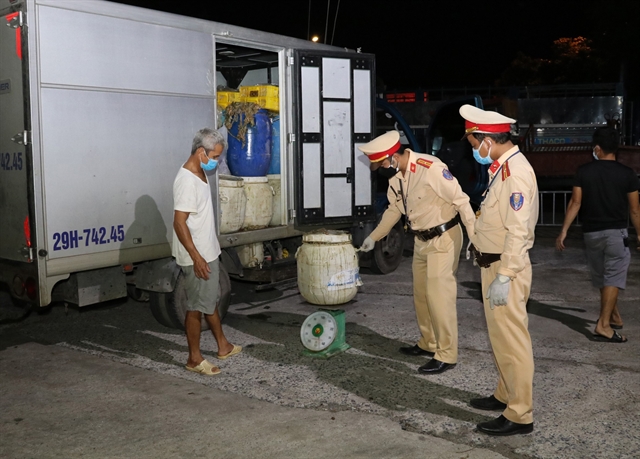 Society
Society


|
| Police inspect a truck carrying decomposed animal organs of unknown origin, suspected to be used for food processing. — VNA/VNS Photo |
HÀ NỘI — The Ministry of Public Security has proposed stricter criminal penalties for producing and selling counterfeit food and additives on e-commerce platforms, according to a draft amendment to the Penal Code.
Under the proposals, individuals found guilty of trading fake food products through digital platforms, with a reach of 500 or more people, could face prison sentences ranging from one to five years.
The current monetary fine for such violations, which ranges from VNĐ20 million to VNĐ100 million (US$765 to $3,800), would double to between VNĐ40 million and VNĐ200 million (US$1,536 to $7,683).
The draft includes more than 160 revisions and introduces harsher punishments for a range of offences related to food safety, environmental harm and public health threats.
In cases where individuals are convicted, authorities could impose additional sanctions such as banning them from certain professions for one to five years, along with confiscating part, or all, of their assets.
Legal entities, including companies, could be fined between VNĐ18 billion and VNĐ36 billion ($670,000 to $1.3 million), double the current penalties.
Companies could also face permanent shutdowns if their actions result in death, serious environmental damage or pose a significant threat to national security and public safety.
The draft also proposes tougher penalties for other food safety violations, including the use of banned chemicals, pesticides, unapproved additives and using diseased or dead animals in food production.
Offenders could be fined from VNĐ300 million to VNĐ3 billion, depending on the level of profit and the number of people affected. Currently, such fines range from VNĐ50 million to VNĐ500 million.
The minimum prison sentence for these offences would increase from one year to three years. As a result, the lightest sentencing bracket would rise from 1–5 years to 3–7 years, while the most severe could reach 15–20 years, up from the existing 12–20 years.
Significantly, the draft removes the requirement that offenders must 'knowingly' use banned substances or contaminated animal products to be held criminally liable. Individuals could face punishment regardless of whether they were aware of the illegality or danger of the substances used.
The proposed changes come amid rising public concern over food safety and growing scrutiny of e-commerce platforms as a channel for illicit trade. — VNS